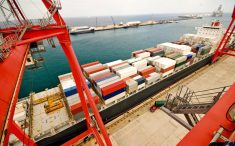Longshore workers at British Columbia’s seaports have voted to accept the terms of a new four-year labour deal, ending five weeks of labour outages at Canada’s West Coast.
Negotiators with the B.C. Maritime Employers Association (BCMEA) and International Labour and Warehouse Union (ILWU Canada), working with the Canada Industrial Relations Board (CIRB), reached a new tentative deal July 30.
BCMEA members said they ratified the agreement last Monday (July 31). ILWU Canada members’ ratification votes, held Thursday and Friday, turned up 74.66 per cent in favour of the new deal, union president Rob Ashton said in a memo Friday.
Read Also

U.S. grains: Soy hits four-month high on hopes for China trade deal
U.S. soybean futures jumped to their highest level in more than four months on Monday on hopes that China will resume buying American supplies after President Donald Trump said the countries were set to reach a trade deal during his trip to Asia this week.
A caucus of ILWU leadership had recommended Aug. 1 that workers approve the new deal.
The employers’ association said late Friday that the new agreement “includes increases in wages, benefits and training that recognizes the skills and efforts of B.C.’s waterfront workforce, while providing certainty and stability for the future of Canada’s West Coast ports.”
About 7,400 longshore workers at Vancouver and Prince Rupert went on strike starting July 1. Their previous collective agreement had expired March 31 and talks had been underway since that time between the parties with federal mediators.
Federal Labour Minister Seamus O’Regan and Transport Minister Pablo Rodriguez, in a joint statement Saturday, said the new deal’s ratification is “good news for the employer, the union, and the many workers and businesses across Canada that rely on our B.C. ports.”
But the ministers also noted the dispute “caused serious disruption to our supply chains, risking our strong international reputation as a reliable trading partner. We do not want to be back here again.”
The new deal follows the ILWU Canada leadership caucus’ rejection of a tentative deal on July 18 — after which union membership voted July 28 to reject a second tentative deal that had the caucus’ support.
O’Regan on July 29 invoked section 107 of the Canada Labour Code and directed the CIRB to see whether the union’s rejection of that second tentative deal had “eliminated the possibility of a negotiated resolution.” If so, he authorized the CIRB to then impose either a new collective agreement or final binding arbitration on both parties.
O’Regan said Saturday that federal officials will “review how a disruption on this scale unfolded, so that in future we can provide greater stability for the workers and businesses across Canada that depend on our B.C. ports.”
On that matter, the ministers said Saturday “we will have more to say on this soon.”
Bulk grain traffic has a Labour Code exemption from any longshore labour outage, but traffic in containerized pulse crops and other agricultural goods and commodities is not exempt.
Farm and business groups and others in recent weeks have called on Ottawa to draft new contingency plans to limit impacts of such disputes. Manitoba Pork and Keystone Agricultural Producers, for example, called last month for all food and agriculture shipments to be declared as essential.
The two groups also called for a process in which mediation is launched before strikes or lockouts take place, and for staggered labour contracts to be set up help ensure “operational continuity in impacted ports during times of disruption.”
Alberta’s Transport Minister Devin Dreeshen, in a separate statement Saturday, also called on the feds to “bring forward mechanisms that provide more stability and predictability in the segments of Canada’s supply chain within its jurisdiction.
“Class 1 rail, ports, and airports are critical pieces of infrastructure and we cannot afford these sorts of disruptions to our province.” — Glacier FarmMedia Network












